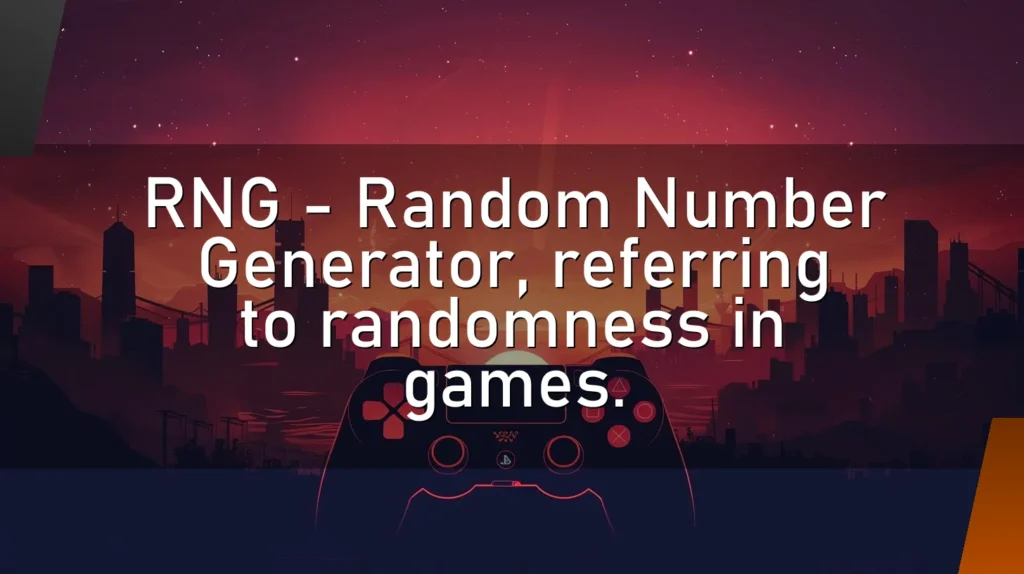RNG – Random Number Generator, referring to randomness in games
How a nerd would describe RNG
Picture this: You’re a wizard in a mythical land, armed to the teeth with fantastical spells and weapons, ready to take on the Big Bad. You cast your most powerful spell, but instead of obliterating the enemy, a tiny, sad puff of smoke appears. What gives? Well, my friend, you’ve just encountered the mystical force known as RNG—Random Number Generator. 🎲✨
In the simplest of terms, RNG is the digital equivalent of rolling a hundred-sided die. It’s the little gremlin inside your computer that decides whether you land a critical hit or miss entirely. Nerds 🧙♂️ might describe RNG as the algorithmic sorcery that dictates the unpredictable elements in video games, ensuring that no two experiences are ever exactly the same.
Details
RNG plays a pivotal role in video games, particularly in genres like RPGs (Role-Playing Games), roguelikes, and even shoot ’em ups. 🎮 It’s the mechanism that determines loot drops, enemy behavior, procedural generation of levels, and even hit probabilities. If you’ve ever wondered why you keep getting that same lame sword instead of the legendary weapon you desire, blame RNG! 😫
The technical magic behind RNG involves algorithms that produce sequences of numbers with no discernible pattern. The seeds for these algorithms can come from various sources like system time or user inputs, making the outcomes as random as possible. While true randomness is a bit of a unicorn 🦄 in computer science, pseudo-randomness is often good enough for gaming purposes.
Other similar words which nerds use
Let’s dive into some other jargon that nerds often toss around when discussing RNG:
- Seed 🌱: The initial value used to generate the sequence of random numbers. Changing the seed can produce entirely different outcomes.
- RNGesus 🙏: A playful term for the god of RNG, often invoked in desperate prayers by gamers seeking good fortune.
- PRNG (Pseudo-Random Number Generator): A type of RNG that uses algorithms to produce sequences of numbers that only appear random.
- Entropy: The measure of randomness or unpredictability in the system.
- Roguelike: A sub-genre of games that heavily relies on RNG for level design and item drops, offering a unique experience each playthrough.
👍 Correct usage
Correct usage of RNG is crucial for maintaining the balance and replayability of a game. When done right, RNG can add excitement and variety to the gameplay, ensuring that players remain engaged. For example:
- Balancing Difficulties: Ensuring enemies don’t always act predictably, keeping players on their toes.
- Loot Drops: Varying the items players receive to keep them striving for that next big find.
- Procedural Generation: Creating unique levels and challenges in each playthrough, like in "Minecraft" or "The Binding of Isaac."
🛑 Wrong usage
However, RNG can also be a double-edged sword. When misused, it can lead to frustration and a sense of unfairness. Here are some ways RNG can go wrong:
- Over-Reliance on Luck: When success in a game depends more on RNG than on skill, it can alienate players.
- Unbalanced Loot Drops: Constantly giving players useless items while withholding rare ones can lead to gamer rage. 😡
- Predictability: If the RNG isn’t truly random, players might detect patterns, ruining the experience.
Conclusion
In the world of gaming, RNG is like that unpredictable friend who keeps things interesting. It brings an element of surprise, making each gaming session unique. However, it’s a fickle friend—one that can also drive you up the wall when it doesn’t go in your favor. The key to good RNG is balance: it should enhance the gaming experience without undermining player skill or causing undue frustration.
So the next time you find yourself cursing your luck in a game, remember: it’s just the capricious nature of RNG at work. Embrace it, for without RNG, the gaming world would be a much duller place. 🎮✨
How is RNG implemented in games?
Implementing RNG in games involves careful coding and testing to ensure that the randomness feels fair and balanced. Developers use complex algorithms, often based on linear congruential generators or Mersenne Twisters, to create sequences that seem random. These algorithms rely on initial values or seeds to kickstart the randomness process. Changing the seed alters the sequence, ensuring a different outcome with each playthrough.
For example, in "Diablo III," the levels, loot, and even enemy placements are determined by RNG, offering a fresh experience every time you dive into a dungeon. On the flip side, games like “XCOM” use RNG for hit probabilities—leading to those nail-biting moments when a 95% chance to hit somehow misses. 😱
Pros and Cons of RNG in Gaming
Advantages:
- Replayability: RNG ensures that no two gaming sessions are identical, enhancing the lifespan of a game.
- Challenge: Random elements can provide a level of unpredictability that keeps players engaged.
- Variety: By shuffling elements like loot, enemies, and levels, RNG prevents the game from becoming monotonous.
Disadvantages:
- Frustration: Over-reliance on RNG can lead to player frustration, especially when outcomes feel unfair.
- Imbalance: Poorly implemented RNG can make games feel unbalanced, either making them too easy or impossibly difficult.
- Perceived Lack of Skill: When success feels more dependent on luck than skill, it can alienate competitive players.
Fun Facts about RNG
- RNGesus: Gamers often personify RNG as a deity named RNGesus, praying for good luck in loot drops and critical hits. 🙏
- Speedrunning: Some speedrunners exploit RNG manipulation techniques to get consistent results in their runs, showcasing skill in controlling randomness.
- Gachapon Games: Mobile games like "Genshin Impact" heavily rely on RNG for character and item pulls, leading to a love-hate relationship among players with their in-game luck.
Importance of Balance
To strike the perfect balance with RNG in games, developers often use hybrid systems that combine randomness with deterministic elements. For instance, in "Overwatch," while critical hits are random, the game ensures that every player gets a fair chance to shine through skill-based matchmaking and balanced gameplay mechanics.
Glossary of Key Terms
- Algorithm: A set of rules or steps followed by a computer to perform a task, like generating random numbers.
- Seed: The initial value used to start the random number generation process.
- Procedural Generation: Creating game content algorithmically rather than manually, making each playthrough unique.
- Loot Drops: Items that are randomly given to players, often after defeating enemies or completing tasks.
- Roguelike: A genre of games characterized by permadeath, procedural generation, and high difficulty, heavily reliant on RNG.
Final Thoughts
RNG is the spice of the gaming world, adding unpredictability and excitement. While it can sometimes be a source of frustration, it also ensures that games remain fresh and engaging. Whether you’re praying to RNGesus for that legendary sword or cursing a missed shot in "XCOM," remember that RNG is there to keep you on your toes. So, embrace the chaos, roll the dice, and enjoy the ride! 🎲✨







